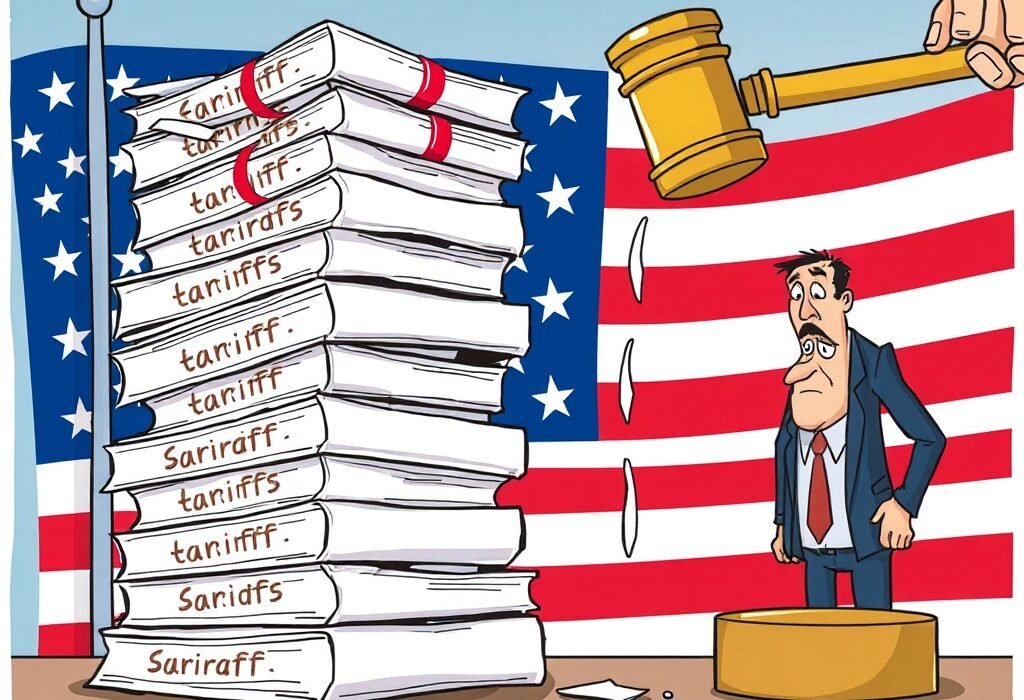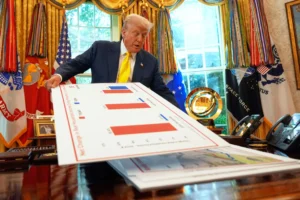Former President Donald Trump faces a major legal setback after federal courts ruled against his signature trade policies. The US court decision strikes down most tariffs imposed during his presidential administration between 2017 and 2021. Trump called the ruling a total disaster for American trade policy and economic security.
Court Decision Sparks Major Political Controversy
The federal court’s comprehensive review found that many Trump-era tariffs lacked proper legal authority under existing trade laws. Judges determined that several tariff categories violated established international trade agreements and domestic regulatory procedures. This ruling affects billions of dollars’ worth of imported goods from multiple nations worldwide.
Trump’s reaction came swiftly through social media platforms, where he criticised the judicial decision as politically motivated. The former president argued that these tariffs protected American workers and strengthened domestic manufacturing capabilities significantly. His statement emphasised concerns about foreign competition and unfair trade practices from rival nations.
Legal experts suggest this ruling could impact current and future trade policies across multiple presidential administrations. The decision establishes important precedents regarding executive authority over international trade regulations and tariff implementation procedures.
Breaking Down the Tariffs That Were Ruled Illegal
The court specifically targeted several major tariff categories that generated substantial revenue during Trump’s presidency. Steel and aluminium imports faced some of the highest tariff rates under national security justifications. Chinese-manufactured goods also received significant tariff increases through various trade dispute mechanisms.
Key tariff categories affected by this ruling include:
- Steel products from the European Union and Canadian suppliers
- Aluminium imports from multiple allied nations worldwide
- Solar panel components from various Asian manufacturers
- Washing machine imports from South Korean companies
- Lumber products from Canadian forestry operations
These tariffs collectively generated billions in revenue while raising consumer prices across numerous product categories. American businesses that relied on imported materials faced increased costs that were often passed to consumers. The court found insufficient legal basis for many of these protective trade measures.
Economic Impact Analysis of the Court’s Decision
The ruling creates uncertainty for businesses that adjusted their operations around existing tariff structures over recent years. Companies invested heavily in domestic production facilities to avoid higher import costs during the Trump administration. Now these firms face potential competitive disadvantages if foreign competitors regain market access.
Consumer prices could decrease for affected products once tariffs are removed or reduced, according to court orders. Home construction costs might decline if lumber tariffs are eliminated through this judicial process. Electronics and appliance prices could also benefit from reduced component costs following tariff removals.
However, domestic manufacturers worry about renewed foreign competition without protective tariff barriers supporting their market positions. Steel producers particularly expressed concerns about Chinese imports undercutting American production through lower labour costs. Union leaders also voiced worries about potential job losses in affected manufacturing sectors.
Political Ramifications forthe Current Administration
President Biden’s administration now faces complex decisions regarding how to respond to this judicial ruling effectively. The current president maintained some Trump-era tariffs while modifying others through diplomatic negotiations and trade agreements. This court decision could force broader policy reviews across multiple government agencies.
Congressional Republicans criticised the ruling as judicial overreach that undermines executive authority over trade policy matters. They argue that presidents need flexibility to respond quickly to unfair trade practices from foreign competitors. Democratic lawmakers showed mixed reactions, with some supporting reduced tariffs while others worry about domestic job impacts.
The timing proves particularly challenging as the administration navigates ongoing trade tensions with China and other major economies. Supply chain disruptions from recent global events have highlighted the importance of domestic manufacturing capabilities. Balancing consumer costs with national security concerns remains a delicate political challenge.
What This Means for Your Wallet
The court’s decision could directly impact prices for everyday products that you purchase regularly throughout the year. Home improvement projects might become less expensive if lumber and steel tariffs face reduction or elimination. Kitchen appliances and electronics could also see price decreases once import costs decline.
Your local businesses that depend on imported materials may benefit from reduced operating costs following tariff elimination. Small manufacturers could gain access to cheaper raw materials while maintaining competitive pricing for their products. Service industries might also benefit from reduced equipment costs, affecting their operational expenses.
However, some domestic producers might face increased competition that could affect local employment opportunities in your community. Manufacturing jobs in steel, aluminium, and other protected industries could face pressure from renewed foreign competition. The overall economic impact will depend on how quickly markets adjust to these regulatory changes.
Looking Ahead: Next Steps in This Legal Battle
Trump’s legal team indicated plans to appeal this decision to higher federal courts, including potentially the Supreme Court. The former president maintains that these tariffs were essential for protecting American economic interests against unfair foreign practices. His appeal strategy will likely focus on executive authority arguments and national security justifications.
Meanwhile, affected businesses are seeking clarity about implementation timelines for any tariff changes resulting from this ruling. Trade associations are lobbying for gradual phase-out periods rather than immediate tariff eliminations that could disrupt established supply chains. International partners are also watching closely as this decision could affect their export strategies.
The ultimate resolution of this legal dispute could take months or years, depending on appeal processes and court schedules. Until then, uncertainty continues affecting business planning and investment decisions across multiple industries and economic sectors nationwide.








Be First to Comment